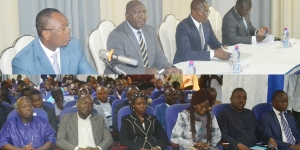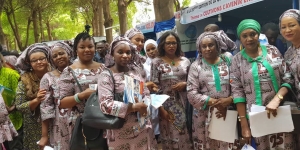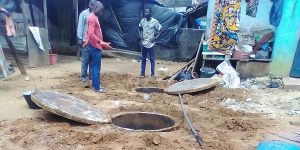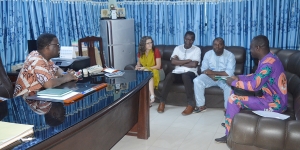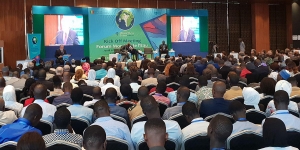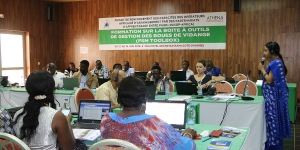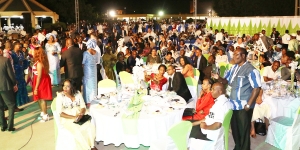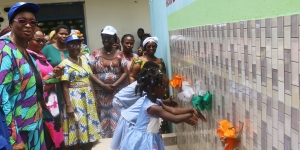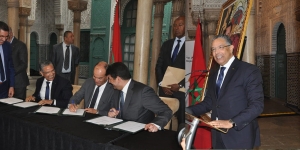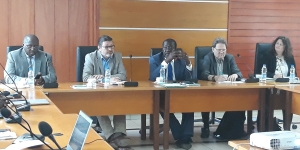Nzickonan Stéphanie
DEVELOPMENT OF A WATER QUALITY LABORATORY TECHNICAL MANAGEMENT MANUAL: DELEGATES FROM FIVE COUNTRIES WERE TRAINED IN LOME
About forty delegates representing national water utilities of five French-speaking African countries (Benin, Cameroon, Guinea, Niger, Togo) - members of the African Water Association (AfWA) - took part in a three-day workshop from 11 to 13 June 2019 in Lomé, Togo, focusing on the ownership of the process of developing a laboratory technical management manual, said a Journalist from Savoir News, the Togolese News Agency.
Organized by AfWA in collaboration with Togolaise des Eaux (TdE) (the Togolese Water Authority) and with the financial support of the United States Agency for International Development (USAID), this meeting was part of the African Water Association's capacity building program in the water and sanitation sector (AfriCap). One of its objectives was to support water quality certification laboratories in the development of their laboratory technical management manuals.
At the opening of the workshop, Mr. Gbati Yawanke, Managing Director of TdE, explained that the laboratory is at the heart of the water treatment process. Indeed, the characteristics of the raw water enabling to define its treatment mode, as well as all the processes to produce drinking water (NDLR), are determined in the laboratory. The role of the laboratory in the water sector is therefore decisive both in terms of organization and management.
For Dr. Simeon Kenfack, Director of Programs at AfWA, a water utility cannot be successful if it cannot provide quality water. (...) When talking about quality, any quality process must start with the provision of a manual (...) that defines the procedures and tools that make it possible to verify, ensure and confirm this quality.
read more on savoir news' website
THE MALIAN NETWORK OF PROFESSIONAL WOMEN IN WATER AND SANITATION, RAISES AWARENESS AMONG MALIANS ABOUT ENVIRONMENTAL CONSERVATION
As part of the implementation of its activity plan, the Malian Network of Professional Women in Water and Sanitation, (REMAFPEA) participates every year in the national celebration of the Fortnight of the Environment, which provides a framework for communication, exchanges and exhibitions to inform and raise awareness among citizens, decision-makers and partners on environmental issues.
Thus, REMAFPEA played its part during the 20th edition which took place from June 5 to 7, 2019 in Bamako by distributing awareness flyers from their exhibition booth advocating for change in the behavior of citizens to take care of their environment, and to achieve a national awareness on the effects of climate change and to fight against pollution of all kinds.
The awareness messages focused on the following slogans or behaviors to adopt: "All Pollution is Harmful to People, Fauna and Flora"; "The Time Has Come to Change Behaviors to Preserve Our Environment"; "Together Let's Preserve Our Air and the Earth! "We all live on the planet and have a moral duty to contribute to its preservation! REMAPFEA is committed to your side and invites all Malians to become responsible citizens on a daily basis!”
REMAFPEA is thus committed to promoting good practices on environmental protection issues and thus becoming a vehicle for information transmission to women in particular and the rest of the population in general.
The Environment Fortnight was established as a result of two world celebrations: June 5: "World Environment Day" and June 17: "World Day to Combat Desertification".
BENIN / SSD TESTS THE INTEGRITY OF SANITATION FACILITIES CONSTRUCTED FOR HOUSEHOLDS IN YEAR 5 OF IMPLEMENTATION
The SSD project recently conducted integrity tests of toilets and sanitation systems built by micro-contractors over two years ago. In Abidjan, this test was carried out in the municipality of Yopougon where the first sanitation facilities were constructed. This test involved eight structures including septic tanks and soak away pits and concluded that the septic tanks were filling normally. The walls were still intact, with a good distribution of sludge in the compartments. As for the soak away pits, the test confirmed the initial hypothesis, namely, a good infiltration of the overflow from the septic tank into the ground, with intact concrete rings as they were installed. However, the water level in the pits was too high, which showed that the infiltration area must be increased. Improvements to the design are now being incorporated.
In Benin, SSD project technical team conducted a survey of 18 users of Mimin latrines to check the level of pit filling in the municipalities of Abomey-Calavy and Porto Novo. At the end of the survey, it was found that only 35% of the pit for double pit latrines were filled after two years of use, which is a good level. 94% of the customers visited during this survey said they were satisfied with the use of the WC Mimin.
BENIN / TOWARDS THE SUSTAINABILITY OF SANITATION CREDIT FOR LOW-INCOME HOUSEHOLDS
As part of the activities of the USAID-funded SSD sanitation project, PEBCo microfinance provides loans to economically weak households to purchase toilets in Abomey-Calavi and Porto Novo. As of April 2019, nearly $253,173 in loans were granted to households through the partnership with the PEBCo Microfinance Institution. These loans were used to pay for the construction of 2,800 latrines in the two municipalities. Recently, a meeting was organized with USAID West Africa, PEBCo, and the Beninese Social Marketing Association implementing the SSD project. At this occasion the MD of PEBCo indicated that he plans to continue providing sanitation credit as part of its financial product range, even after the SSD project has been completed. "We do not want to stop the sanitation credit at the end of the project, it will now be instituted as a PEBCo product. We hope to have other partners to offer the subsidized interest rates to the targets," said the Managing Director of Microfinance. This commitment was welcomed by USAID, who congratulated PEBCo microfinance.
9TH WORLD WATER FORUM “DAKAR 2021”: OFFICIAL PREPARATORY PROCESS LAUNCHED
Officially the Kick-Off the Meeting (Preparatory Process) of the World Water Forum was launched on Thursday 20 and Friday 21 June 2019 in Dakar. The activity was launched by the Minister of Water and Sanitation, Serigne Mbaye Thiam and the President of the World Water Council, Loïc Fauchon.
This meeting marks the official launch of the preparation of the World Water Forum which will take place in Senegal in March 2021. During this meeting, the actors shared the experience in the field of organization to enable Senegal to better to succeed this 9th Forum.
This forum, the first in sub-Saharan Africa will have an African color according to the Executive Secretary of the World Water Forum, Abdoulaye Sene. For him, this Senegalese Forum will bring an African touch in the organization because it is above all a forum of Africa. Abdoulaye Sene reported that 670 participants were registered for the meeting including 211 participants from 53 countries from all continents and 459 nationals.
The Minister of Water and Sanitation, Serigne Mbaye Thiam, indicates that this forum is the first African after that of Marrakech in 1997. According to Serigne Mbaye Thiam, the choice of Senegal, the first African country south of the Sahara designated as a host country, "is a mark of recognition of the enormous progress made by our country in the field of water and sanitation, but also in terms of hydro-diplomacy."
The Senegalese Minister pointed out the Senegal Forum will have an integrated preparation based on multi-stakeholder open-ended exchanges around four priorities: water security, cooperation, water for rural development and the box "Tools and Means »including crucial issues of funding, governance, knowledge management and innovations. Serigne Mbaye Thiam said that to better address the Forum, series of events "Road To Dakar" will be organized by March 2021.
The President of the World Water Council, Loïc Fauchon, called for a full involvement of all to flavor the water resource. "The planet is suffering from water problems when it is full of water," says the president of the World Water Council. Loïc Fauchon has a thought for those inhabitants of the poor population with contaminated water that cause hundreds of millions of deaths in the world. According to the president of the World Water Council, the success of all decisions of the Forum will depend on the ability to mobilize actors around the triptych: knowledge, governance and finance.
Source : www.lejecos.com
NON-SEWER SANITATION: AFWA TRAINS AFRICAN EXPERTS ON THE IMPROVED VERSION OF THE FECAL SLUDGE MANAGEMENT (FSM) TOOLBOX.
Almost 2 years after the first workshop held in Durban, South Africa, to review the Fecal Sludge Management toolbox, AfWA has organized a training workshop in Grand Bassam, Côte d'Ivoire, from 12 to 14 June 2019 to familiarize stakeholders involved in the RASOP Africa Project (Capacity building Project of sanitation operators through peer to peer learning partnerships) with the use of the improved version of this tool.
The thirty participants from South Africa, Zambia, Uganda, Mali, Senegal, Cameroon and Côte d'Ivoire were mainly sanitation operators, municipal technical staff, RASOP Africa consultants and some of the African academic experts. During 3 days, they were trained on the functionalities of the new fecal sludge management toolbox, this digital platform designed for decision-makers to support them in diagnosing the state of sanitation, better plan sanitation infrastructures and monitor progress made.
According to the trainer, Mrs. Deepa Karthykeyan, Director of Athena Infonomics, promoter of this platform, the sanitation problems are similar in all parts of the world. The Fecal Sludge Management Toolbox has the advantage of addressing all the concerns of the sanitation chain and enabling decision-makers to make informed decisions to improve the state of sanitation in their cities.
For the participants, this workshop was really important as one of the major challenges in Africa remains the lack of reliable and simple tools to diagnose and manage sanitation. Thus, the use of the sludge management toolbox will enable them to better guide their decisions and thus their actions to improve the living conditions of the populations in their countries.
The Fecal sludge management toolbox was first developed by the Asian Institute of Technology (AIT, Bangkok) and then later improved by Athena Infonomics, all with funding from the Bill and Melinda Gates Foundation.
AFWA: 40 YEARS OF IMPROVING THE PERFORMANCE OF WATER AND SANITATION UTILITIES IN AFRICA
The year 2020 marks the 40th anniversary of the African Water Association. To this end, the Executive Directorate, with the support of the Scientific and Technical Council, has decided to mark the event by organizing a number of activities that will contribute to raising awareness of AfWA and to attracting new members and mobilizing funds for the implementation of its projects. It will also be an opportunity to recognize the merits of the founding fathers who, forty years earlier, had the ingenious idea of setting up this platform, which is now a must on the African continent, to exchange experiences and share best practices in the operationalization of companies producing and distributing drinking water and sanitation services, and to improve their performance. It will also mean looking to the future to ensure that future generations have access to safe water in quantity and quality as well as adequate sanitation services. The various AFWA networks, as well as the specific sectors (water and sanitation) will not be ignored. The best of them will be rewarded. The launch ceremony of this 40th anniversary took place on Thursday, April 4, 2019 during the closing gala dinner of the CST in Rabat, Morocco, and the highlight will take place in February 2020 in Kampala, Uganda, during an award evening organized in conjunction with the 20th Congress. Thus, in order to give a spirit of communion and a continental aspect to this anniversary, as well as to encourage the involvement of all, each member is invited to organize an activity of his choice in his country (conference, debate, awareness day, panel discussion, open house...) in the period from July to November 2019. AfWA is all of us. Let us all mobilize and give this 40th anniversary a pan-African glow. All in Kampala from 24 to 27 February 2020 to celebrate water and sanitation
THE IVORIAN NETWORK OF PROFESSIONAL WOMEN IN WATER, SANITATION AND THE ENVIRONMENT PROVIDED STUDENTS AT A PUBLIC PRIMARY SCHOOL IN CÔTE D'IVOIRE, WITH RUNNING WATER AND MADE THEM AWARE OF WASTED WATER
The students of Groupe Scolaire SOGEFIHA Antenne of Yopougon Niangon, (Abidjan-Côte d’Ivoire) have now running water in their school. Indeed, the Ivorian Network of Professional Women in Water, Sanitation and the Environment donated them 3 water points on Wednesday, 8 May and made them aware of wasted water and gutter cleanliness. This donation came as a big shot in the arm for the 500 students and their teachers who were suffering from the lack of running water in the school. They thanked the generous donors for these donations and promised to take care of them.
ONEE AND THE CASABLANCA-SETTAT REGION SIGNED A MAJOR PARTNERSHIP AGREEMENT WITH A TOTAL COST OF €44 MILLION TO INCREASE THE RATE OF ACCESS TO DRINKING WATER IN RURAL AREAS TO 99% IN THE REGION BY THE END OF 2023
On Monday, 15 April, 2019, Mr. Abderrahim EL HAFIDI, Director General of “Office National de l’Electricité et de l’Eau Potable” (ONEE) and Mr. Mostafa BAKOURI, President of the Casablanca-Settat region, signed a partnership agreement for the development of the Casablanca-Settat region, which aims to accelerate the programme to provide universal access to drinking water and improve the living conditions of the region's rural population.
2004 to date, ONEE in partnership with local authorities has carried out a major investment programme of 1.74 billion Dirhams (€160 million) which has provided drinking water to a rural population of about 1,163,000 inhabitants in the region. This helped to increase the access rate from 52% in 2004 to 95.5% at the end of 2018.
Also, a programme covering the 2019-2021 period is currently being implemented in various provinces of the region with a budget of 587 million Dirhams (€54 million).
This programme will serve an additional rural population of approximately 292,000 inhabitants and increase the access rate in the region to 97.7%.
This partnership agreement between ONEE and the Casablanca-Settat region, with a total cost of 471 million Dirhams (€54 million), is part of this region's development approach. The projects programmed within this framework will provide drinking water to a rural population of about 200,000 inhabitants and increase the rate of access to drinking water in rural areas in the region to 99% by the end of 2023.
AfWA-GERMAN WATER PARTNERSHIP (GWP) PARTNERSHIP: THE FIRST STEPS TOWARDS A WIN-WIN COLLABORATION ARE ON THE HORIZON
AfWA Capacity Assessment Mission, commissioned by the German Ministry for Economic Cooperation and Development, which began on 13 May and is expected to result in the financing of a collaborative project between AfWA and the German Water Partnership (GWP) to build the capacity of African actors in the water and sanitation sector, ended on 17 May 2019 with promising perspectives.
For 5 days, a delegation composed of Jurgen Henkel, SEQUA Project Director, Marcus Casel, SEQUA consultant and Nathalie Kolbe, International Projects Manager at the German Water Partnership, visited AfWA and some of its partners to explore the possibilities of establishing this win-win partnership with the Pan African Association. Indeed, in addition to a working session it had with the Presidents of the AfWA’s Scientific and Technical Council, Dr Papa Samba and Dr Rose Kaggwa, who came respectively from Senegal and Uganda for this meeting, the delegation met with AfWA’s members (SODECI, ONEP, ONEP, ONAD, SOTICI) as well as ministries of the WASH sector (Ministry of Hydraulics, Ministry of Construction, Sanitation and Urban Planning,)
The mission ended with a feedback and exchange workshop on the project proposal presented by AfWA. For Jurgen Henkel, the mission produced results beyond his expectations. He thanked the Executive Director of AfWA, Mr Sylvain Usher and the Director of Programmes, Dr Kenfack, for facilitating meetings with various stakeholders. There is no doubt in his mind that AfWA has the necessary capacity to receive funding from the German Ministry of Cooperation because of its expertise in the implementation of donor-funded projects.
It is important to note that the results of this future partnership have begun to be noticed through AfWA's contact with two members of the German Water Partnership that expressed the desire to join the Pan-African Association as well as GWP’s expressing its willingness to participate in the exhibition of the 83rd session of AfWA’s Scientific and Technical Council to be held in November 2019 in Kampala, Uganda.

 English
English  Français
Français 
